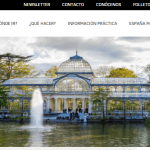Cáceres and Mérida, two cities in Extremadura, have begun work towards becoming Smart Destinations, hand in hand with SEGITTUR and with support from the Government of Extremadura. This project, together with the review of the work carried out with Valle del Jerte, is being financed through a subsidy from the Council of Culture, Tourism and Sport.
An initial virtual meeting has been held, during which the initiative was presented by experts from SEGITTUR to those involved in the management of the two destinations.
Role of the Government of Extremadura
The Regional Government of Extremadura firmly supports the Smart Destinations model, and therefore has been working with SEGITTUR for several years. In 2021, the work to turn Cáceres and Mérida into Smart Destinations will begin, and the work carried out with Valle del Jerte as part of an action plan produced following the creation of a diagnostic report in 2019 will be assessed.
Over the coming weeks, interviews with senior leaders in Cáceres and Mérida will be held, as well as with different people directly and indirectly involved, as this project is extremely transversal and involves the different municipal departments.
Smart Destination methodology
A Smart Destination is an innovative tourist destination based on technological infrastructure, that guarantees the sustainable development of tourist areas accessible to all, while also improving the quality of life for residents and the experiences of tourists at the destination.
The work is based around the Secretary of State for Tourism’s Smart Destination methodology, which assesses nearly 300 requirements linked to the five categories Smart Destinations focus on: governance, innovation, technology, accessibility and sustainability.
The results of the meetings and analysis of the information provided by all the parties involved will be used to assess the level to which Cáceres and Mérida comply with each category. This will serve as the basis for the diagnostic report and the action plan to turn it into a Smart Destination.
Cooperation between the private and public sectors and between companies and individuals in the destinations is key to the successful competitive development of Cáceres and Mérida and to the Smart Destinations model having the desired impact.
Benefits of the Smart Destinations model
To the Chairman of SEGITTUR, Enrique Martínez, “A destination becoming a Smart Destination adds value to the destination through innovation and technology, bringing with it increased competitiveness and improved efficiency, as well as a boost to the destination’s sustainable development, environmentally, economically and socio-culturally speaking.”
“Cáceres, as a reference city among Spain’s World Heritage Cities, is a reference point for making cultural management more technological,” explained the mayor of Cáceres, Luis Salaya. He highlighted that this city “embraces technology as complementing a more complete vision, providing increased information for over a decade through its Cáceres Creativa strategy and more recently through the Cáceres Patrimonio Inteligente project.”
The mayor of Mérida, Antonio Rodríguez Osuna, noted that the transformation of the destination aims to improve tourism experiences, while also highlighting that Mérida, a World Heritage City, needs to complement its attractive heritage and archaeological features with increased digitalisation that better understands tourists’ current needs.





